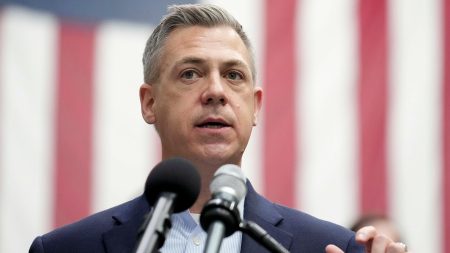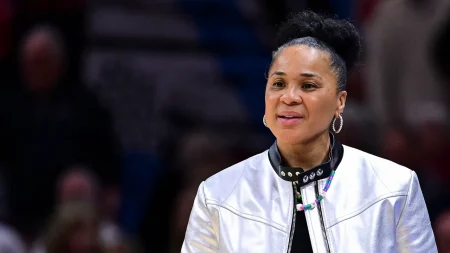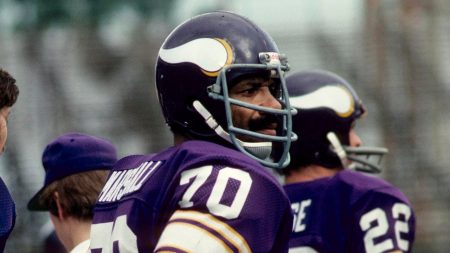The controversy surrounding transgender athletes in women’s sports has reached Martin Luther King Jr. High School in Riverside, California, sparking a clash between state law, student protests, and national debate. Two female cross-country runners allege that school administrators equated their “Save Women’s Sports” T-shirts to swastikas, igniting a firestorm of criticism from students, parents, and national figures like Riley Gaines and Jennifer Sey, prominent advocates for protecting women’s sports. The Riverside Unified School District (RUSD) maintains that its hands are tied by California law, which mandates the inclusion of transgender athletes on teams consistent with their gender identity. The district’s statement deflects responsibility to state and federal lawmakers, urging those opposed to the policy to direct their concerns towards the legislative bodies that crafted it.
The RUSD cites specific sections of the California Education Code, California Code of Regulations, and California Interscholastic Federation (CIF) bylaws to underscore its legal obligation to comply with state mandates regarding transgender athletes’ participation. These legal frameworks prioritize inclusivity and prohibit discrimination based on gender identity, compelling the district to allow transgender students to compete in sports aligned with their gender identity, irrespective of their biological sex. While acknowledging the ongoing legal and societal discussions surrounding this issue, the RUSD emphasizes its commitment to upholding the law and its core values of equity and well-being for all students. This legal framework places the district in a difficult position, caught between state mandates and the concerns of students and parents.
This incident reflects a broader national trend of legal battles and public discourse surrounding transgender athletes in women’s sports. California, with its 2014 AB 1266 law, has been at the forefront of this movement, guaranteeing transgender students the right to participate in sports according to their gender identity. The Martin Luther King Jr. High School case echoes similar controversies at other institutions, including the University of Nevada, Reno, where the women’s volleyball team faced backlash for initially refusing to play against a team with a transgender athlete. These instances highlight the challenges faced by schools and universities navigating the complexities of state laws, student concerns, and national debates on fairness and inclusion in sports.
The University of Nevada, Reno incident also underscores the legal ramifications of defying state laws protecting transgender athletes. The university cited Nevada’s Equal Rights Amendment, adopted in 2022, which explicitly prohibits discrimination based on gender identity, explaining that forfeiting a game for this reason would constitute a legal violation. This case ultimately resulted in a forfeit due to insufficient players, but it served as a stark reminder of the legal constraints placed on institutions by state legislation. The Nevada case, similar to the situation in Riverside, illustrates the legal complexities and potential consequences faced by institutions navigating these sensitive issues.
The controversy extends beyond California and Nevada, illustrating the national scope of the debate. Even in states with laws restricting transgender participation in sports, legal challenges have arisen. In New Hampshire and Virginia, judges appointed during the Obama administration issued rulings allowing transgender athletes to compete on girls’ teams, highlighting the role of the judiciary in shaping the implementation of these policies. These rulings, often based on interpretations of existing anti-discrimination laws, further complicate the landscape and create inconsistencies across different states and jurisdictions.
The Biden administration’s expansion of Title IX to include gender identity adds another layer of complexity. While the administration claims the rule doesn’t address athletic eligibility, experts argue it could indirectly lead to increased inclusion of transgender athletes in women’s sports. This federal intervention further intensifies the debate and raises questions about the potential impact on women’s sports. The interplay between state laws, federal regulations, and court rulings creates a complex and evolving legal environment that makes these situations challenging to navigate.
Amidst the legal and political maneuvering, students at Martin Luther King Jr. High School continue to voice their dissent. Over 150 students have reportedly worn “Save Women’s Sports” T-shirts to school in protest, despite alleged disciplinary actions. This student activism underscores the deeply personal nature of the issue and the strong feelings it evokes. The students’ continued protests demonstrate their commitment to advocating for their beliefs, even in the face of potential repercussions, and serve as a reminder that this issue is not merely a legal abstraction, but one that directly affects the lives of students and athletes. The unfolding events at Martin Luther King Jr. High School represent a microcosm of the national debate, highlighting the complex intersection of legal obligations, student activism, and evolving societal norms.










